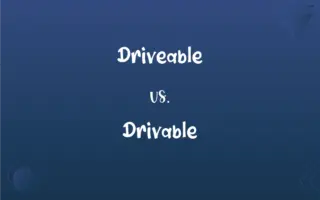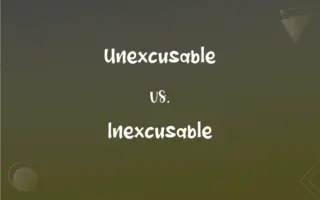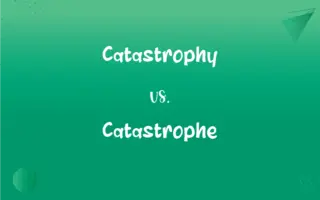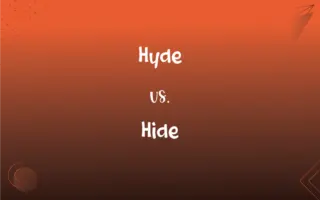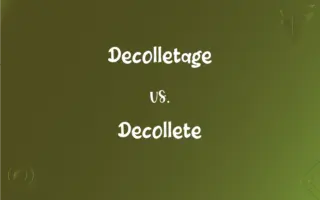Placque vs. Plaque: Mastering the Correct Spelling
Edited by Aimie Carlson || By Janet White || Updated on March 14, 2024
The incorrect spelling "Placque" is often mistaken for the correct spelling "Plaque," which refers to a flat plate or tablet for ornament or inscription.
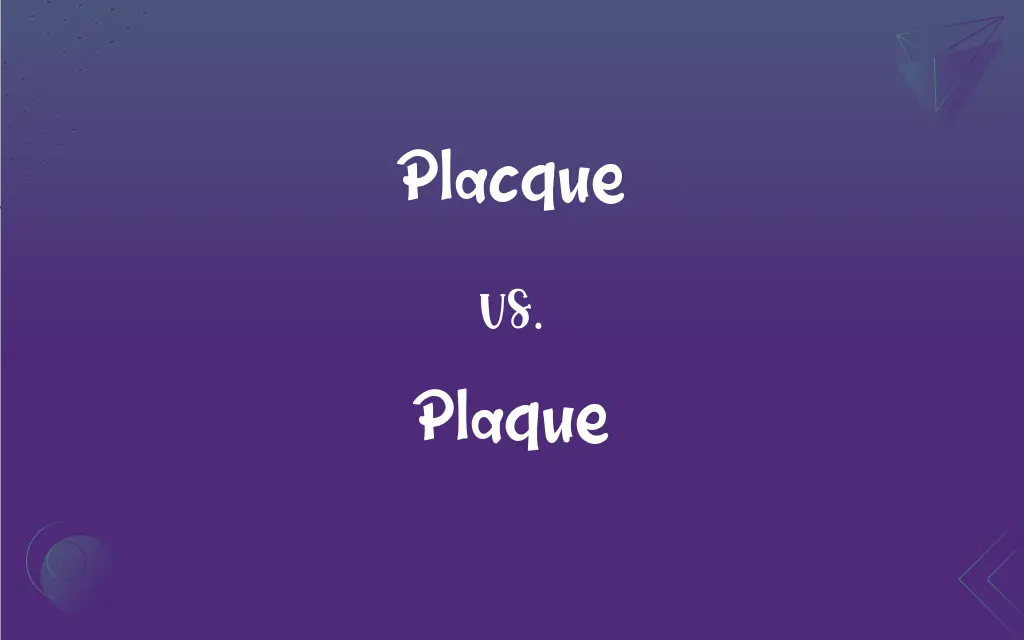
Which is correct: Placque or Plaque
How to spell Plaque?

Placque is Incorrect

Plaque is Correct
ADVERTISEMENT
Key Differences
Connect "plaque" with "plate," as both refer to a flat surface and have similar spellings.
Notice that "plaque" contains the word "la," reminding you to keep it simple with no extra 'c' or 'q.'
Remember that "plaque" rhymes with "black," but it's not spelled with a 'c.'
Think of "plaque" as lacking extra letters; it's efficient and to the point.
Relate "plaque" to "aqua," both have the "aq" letter sequence, making them unique but correct.
ADVERTISEMENT
Correct usage of Plaque
The dentist said he found a lot of placque on my teeth.
The dentist said he found a lot of plaque on my teeth.
I saw a beautiful placque at the antique store.
I saw a beautiful plaque at the antique store.
A placque in the park commemorates the event.
A plaque in the park commemorates the event.
She received a placque for her service to the community.
She received a plaque for her service to the community.
The building was marked with a historic placque.
The building was marked with a historic plaque.
Plaque Definitions
Plaque refers to a flat piece of metal or stone with an inscription or decoration.
The plaque on the wall commemorates the battle.
Plaque can also describe a buildup in arteries.
Plaque in arteries can cause heart disease.
Plaque can be an emblem or sign of certification.
The company received a plaque for safety.
A flat plate, slab, or disk that is ornamented or engraved for mounting, as on a wall for decoration or on a monument for information.
A small pin or brooch worn as an ornament or a badge of membership.
A scaly patch on a body part, especially the skin.
A biofilm of bacteria in a matrix of polysaccharides and other substances on the surface of a tooth or teeth.
A deposit of fatty material on the inner lining of an arterial wall, characteristic of atherosclerosis.
The material that such a deposit is composed of.
A deposit consisting mainly of beta-amyloid and degenerating nerve tissue, found in the brain tissue of people with Alzheimer's disease.
A sharply defined zone of demyelination in the central nervous system characteristic of multiple sclerosis.
A clear, often round patch of lysed cells in an otherwise opaque layer of a bacteria or cell culture.
(countable) Any flat, thin piece of clay, ivory, metal, etc., used for ornament, or for painting pictures upon, as a dish, plate, slab, etc., hung upon a wall; also, a smaller decoration worn by a person, such as a brooch.
(countable) A piece of flat metal with writing on it, attached to a building, monument, or other structure to remind people of a person or an event.
(countable) A small card representing an amount of money, used for betting in casinos; a sort of gaming chip.
A clearing in a bacterial lawn caused by a virus.
In the Hornbostel–Sachs classification system: any flat, thin musical instrument.
Blown plaques
Aconcussion plaques
A broad patch of abnormal tissue distinguishable from surrounding tissue, especially a broad irritated]] patch on the skin.
An abnormal accumulation of material in or on an organ of the body, often associated with disease.
Amyloid plaque
Apleural plaque
Asenile plaque
An accumulation in artery walls made up of macrophage cells and debris containing lipids, (cholesterol and fatty acids), calcium, and connective tissue; an atheroma.
An accumulation of biofilm, or bacteria, on teeth, which may develop into dental calculus (tartar).
A deposit of beta-amyloid protein occurring in a nerve cell and associated with Alzheimer's disease.
Any flat, thin piece of metal, clay, ivory, or the like, used for ornament, or for painting pictures upon, as a slab, plate, dish, or the like, hung upon a wall; also, a smaller decoration worn on the person, as a brooch.
(pathology) a small abnormal patch on or inside the body
A memorial made of brass
In dentistry, plaque is a sticky film of bacteria on teeth.
Regular brushing helps remove plaque.
In pathology, plaque can be a clear area of cell destruction.
The plaque on the skin indicated an infection.
Plaque Sentences
He received a plaque for twenty years of service at the company.
The artist's work was recognized with a plaque in the city square.
Dental plaque can lead to tooth decay if not removed.
A bronze plaque was installed to honor the founder of the school.
Removing plaque regularly is important for oral health.
The plaque was unveiled during the ceremony to applause from the crowd.
The plaque on the wall tells the story of the town's founding.
Plaque accumulation is a common cause of gum disease.
Doctors advise using specific toothbrushes to remove plaque more effectively.
The family donated a bench with a plaque in memory of their loved one.
The plaque dedicated to the veterans was placed in the park.
The plaque describes the significance of the historic site to visitors.
A wooden plaque hung above the fireplace, bearing the family crest.
The information plaque provides visitors with details about the artwork.
The historic house was marked with a plaque stating its significance.
FAQs
What is the verb form of Plaque?
There is no standard verb form of "plaque."
What is the root word of Plaque?
The root word is the French "plaque," meaning a plate or flat surface.
Why is it called Plaque?
It is called "Plaque" because it is derived from the French word for "plate," describing its flat, plate-like shape or form.
Is Plaque a noun or adjective?
"Plaque" is primarily a noun.
What is the pronunciation of Plaque?
The pronunciation is /plak/ in American English.
Is Plaque an abstract noun?
No, "plaque" is a concrete noun, as it can be physically observed.
What is the singular form of Plaque?
"Plaque" is the singular form.
Which preposition is used with Plaque?
Prepositions like "on," "in," and "of" can be used with "plaque."
Which vowel is used before Plaque?
The vowel 'a' is used before "plaque."
Is Plaque a collective noun?
No, "plaque" is not a collective noun.
What is the plural form of Plaque?
The plural form is "plaques."
Which conjunction is used with Plaque?
Conjunctions such as "and," "or," and "but" can be used with "plaque."
Is Plaque a countable noun?
Yes, "plaque" is a countable noun.
What is the second form of Plaque?
"Plaque" does not have a second form.
Which article is used with Plaque?
The articles "a" or "the" can be used with "plaque."
Is Plaque an adverb?
No, "plaque" is not an adverb.
Is the word Plaque imperative?
No, "plaque" is not an imperative word.
How many syllables are in Plaque?
There is one syllable in "plaque."
What is another term for Plaque?
Another term for "plaque" could be "tablet" or "sign."
Which determiner is used with Plaque?
Determiners like "this," "that," "some," and "any" can be used with "plaque."
What is the first form of Plaque?
"Plaque" does not have different forms as it is a noun.
Is Plaque a vowel or consonant?
"Plaque" is a word, not a vowel or consonant.
Is the Plaque term a metaphor?
No, "plaque" is not generally considered a metaphor.
How do we divide Plaque into syllables?
"Plaque" is a one-syllable word and cannot be divided.
What is the third form of Plaque?
"Plaque" does not have a third form.
Is Plaque a negative or positive word?
"Plaque" is neutral; its connotation depends on the context.
What is a stressed syllable in Plaque?
The entire word "plaque" is stressed, as it is a one-syllable word.
What part of speech is Plaque?
"Plaque" is a noun.
What is the opposite of Plaque?
There is no direct opposite for "plaque."
How is Plaque used in a sentence?
"Plaque" can be used in a sentence like, "The dentist warned me about the buildup of plaque on my teeth."
About Author
Written by
Janet WhiteJanet White has been an esteemed writer and blogger for Difference Wiki. Holding a Master's degree in Science and Medical Journalism from the prestigious Boston University, she has consistently demonstrated her expertise and passion for her field. When she's not immersed in her work, Janet relishes her time exercising, delving into a good book, and cherishing moments with friends and family.
Edited by
Aimie CarlsonAimie Carlson, holding a master's degree in English literature, is a fervent English language enthusiast. She lends her writing talents to Difference Wiki, a prominent website that specializes in comparisons, offering readers insightful analyses that both captivate and inform.

